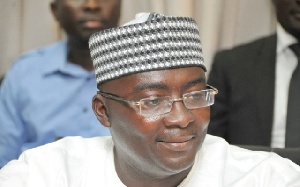Vice President Dr Mahamudu Bawumia interacting with Mavis Hawa Koomson (right), Minister for Special Development Initiative, during the ceremony at Dodowa. Looking on is Frema Osei-Opare
Government is set to begin the construction of some 25,000 boreholes in a bid to ensure that every Ghanaian gets access to potable water.
It also plans to construct 300 small town water systems in rural areas.
This was made public by Vice President Dr Mahamudu Bawumia during the inauguration and orientation of a 10-member team for the coastal development zone in Accra yesterday.
It is expected to develop strategies for the implementation of one of the ruling New Patriotic Party’s (NPP’s) flagship interventions – the Infrastructure for Poverty Eradication Programme (IPEP).
Strategy
The IPEP is a key intervention of Akufo-Addo’s NPP government aimed at directing capital expenditure towards constituency-level infrastructure and economic development priorities.
Government has allocated to each of the 275 constituencies the Ghana cedi equivalence of US$1 million annually to finance the implementation of the projects.
This intervention is also expected to promote inclusive development, create jobs with active involvement of the private sector and contribute to the eradication of poverty in rural and deprived communities.
Under IPEP, priority initiatives, including ‘one village, one dam,’ agricultural infrastructure (warehouses and markets), ‘water for all’ sanitation and ‘one district, one factory’ projects, are expected to be implemented.
Priority
Speaking at the programme yesterday, the vice president revealed that “specifically, under the ‘one village, one dam’ initiative, thousands of irrigation dams will be constructed in the three northern regions.”
Apart from that, he also indicated, “Priority attention will be given to areas that suffer from the annual overflows of the Bagre Dam in Burkina Faso” and that “the constructed irrigation dams will be expected to absorb water released from the overflows to support farming activities in those constituencies.”
He said, “Through the agriculture infrastructure initiative, markets and storage infrastructure with drying systems, will be constructed at the constituency level. The drilled boreholes will be fitted with simple hand-pumps to serve the identified communities in the constituencies. Significant investments will also be directed towards the rehabilitation and expansion of existing or broken-down boreholes and small town water supply systems.”
The IPEP is also expected to provide for the construction of household and public toilets, refuse collection systems, engineered landfill sites and sewerage treatment plants to address the poor sanitation situation.
Dr Bawumia therefore stressed the belief that the outcome of the needs assessment process would also engender complementary projects, including bridges, basic school buildings, Community-Based Health Planning and Services (CHPS) compounds and others, with consideration to be given to the rehabilitation and expansion of existing or broken-down infrastructure in the various constituencies.
Charge
The Veep expressed the hope that members of the team would bring to bear their expertise and knowledge in managing the process of implementation.
“You will also need to enhance your collaborative and cooperative skills in dealing with the constituencies under your jurisdiction,” he said.
“Let me reassure you that you have the full support from His Excellency the President, myself and the entire government officials.”
Dr Bawumia was optimistic each and every one of them would work hard to ensure the successful implementation of the IPEP.
Politics of Saturday, 15 July 2017
Source: dailyguideafrica.com

















